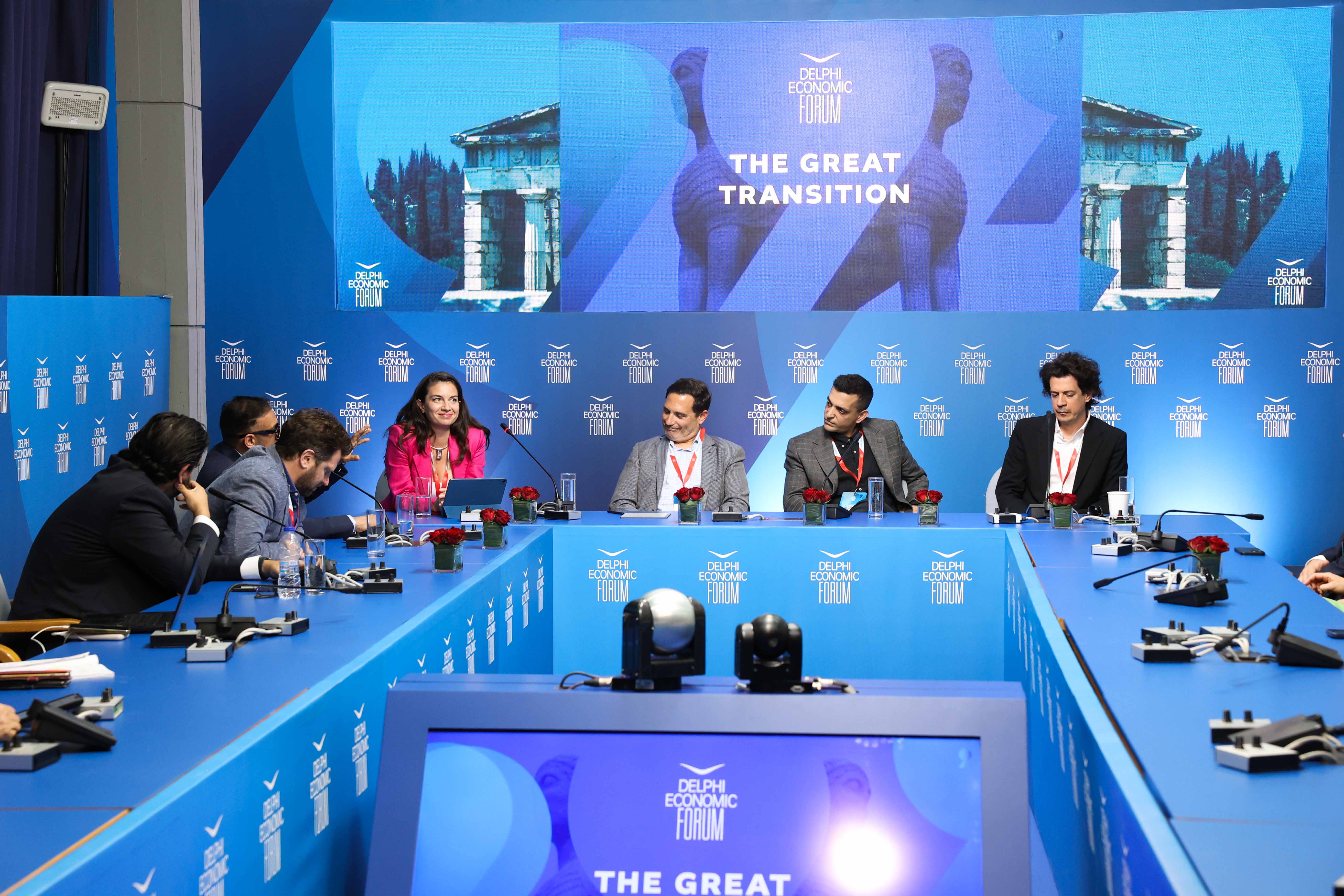BLOG
How Will AI Transform the World
By Endeavor Greece
May 07, 2024

Since the spectacular public launch of ChatGPT last year, the world has been marveling at the powers of generative AI. And also worrying about how these new tools might transform our lives.
What industries will artificial intelligence upend? What jobs will it replace? What creative and scientific breakthroughs will it enable? And who will reap the huge economic benefits – projected to be up to 10% of $8.8 trillion – that these new tools are projected to create?
It’s early days for these conversations, but questions this important can’t wait. That’s why last week Endeavor Greece and the Delphi Economic Forum gathered six top experts in AI to discuss the potential and pitfalls of the AI revolution.
The panel was moderated by Andreas Stavropoulos Endeavor Greece Vice Chairman and a partner at US-based VC firm Threshold Ventures, and included tech journalist and The Recursive co-founder Irina Obushtarova, Plum Fintech CEO Victor Trokoudes, Orfium CTO Michalis Petychakis, MIT CS professor and chair of Greece’s National Committee for Artificial Intelligence Constantinos Daskalakis, Head of Consulting and AI leader for EY Greece Elias Vyzas, and Epignosis CEO Nikhil Arora.
Another dot com boom?
While these diverse voices in the AI field brought different perspectives and opinions to the table, they all agreed on one thing — AI will transform the world. Obushtarova compared the disruption to the dot com boom.
“It affects the new business models. It affects the services that we're going to use. It affects the products that we're going to use, and it's going to redefine the economy,” she predicted. It may also help smaller countries access the human capital they need to compete on the global stage, she added.
Trokoudes and Arora offered further shading, based on their experience as founders, to how generative AI tools may soon democratize access to training and financial advice. Petychakis expressed optimism that AI will increase the output and range of human creators rather than replace them but conceded questions about how artists will be able to make a living from their work still need to be worked out. Arora emphasized the opportunity AI has to streamline learning and skilling, empowering small businesses, freelancers and individual contractors worldwide. Epignosis’s CEO also underscored the significance of learning in fostering purpose and inspiration, essential elements for human motivation and, thus, innovation.
All this change will create winners and losers, of course. And make some people incredible amounts of money.
Vyzas tells his enterprise clients, “You shouldn't wait until things get clear because I don't think they're going to get clear anytime soon. You may lose without even trying.” He offered a framework of questions large enterprises should consider when thinking through their approach to AI implementation.
The risk to the big and slow moving means opportunities for the fast and nimble. “Incumbents instead of having an advantage end up having a disadvantage when you have a paradigm shift,” Stavropoulos observed. The advent of mobile saw the fall of Nokia and Ericsson and the rise of Apple and Google. The AI revolution is likely to create another wave of winners and losers.
What kind of world will AI create?
Everyone may agree that disruptive change is coming, but what the world will look like after remains an open question. Calling himself an AI “realist,” Daskalakis laid out how far research in the field has come in recent years and how many important technical and societal questions remain to be answered.
Recent advances have “unlocked our ability to understand semantically data modalities that were not accessible to us before, like images, speech, natural language molecules, proteins. So now you have the opportunity to extract value that is there in the data,” he explained.
But all that data was created by all of us going about our lives, advancing and sharing knowledge in various forms. “We have to figure out a framework for how to share that value,” Daskalakis stressed.
Finding a fair and sustainable way to spread the benefits of AI will require the spread of AI literacy across the population. It will also require regulatory frameworks to govern how humans interact with new AI agents in what Daskalakis described as “complex AI ecosystems.”
“We need to be prepared about the impact of what happens when two agents, either two AI agents or more AI agents or AI agents and humans, are co-present making decisions and taking actions in the same ecosystem. And that technology we do not have,” he said, concluding: “That's the future we definitely have to build before vastly deploying this tech.”
“In the age of AI, we have a lot of questions about transparency, ownership, accountability, and actually the whole industry is talking about this,” agreed Petychakis.
The open questions around AI may be weighty, but that didn’t stop the panel from ending on an optimistic note. Asked by Stavropoulos how AI will affect how humans conceive of their place in the world, the speakers offered a largely hopeful vision, though several underlined the need for training, versatility, and resilience.
“I really hope that we'll turn into a society where we can play more, where we can explore more and create more,” replied Obushtarova (referencing a recent trip to Burning Man as an inspiration for her vision).
“AI is going to help us. It's going to increase our possibilities. It's going to be a tool. We have to decide where this tool is better than us and how we can compliment a tool where we're better,” offered Daskalakis. While AI will provide us with vastly more information and options, at the end of the day it will always be humans who need to choose which of these possibilities to build upon and which to discard. That’s both a heavy responsibility and a reason for excitement as we look ahead to how AI will transform the world.